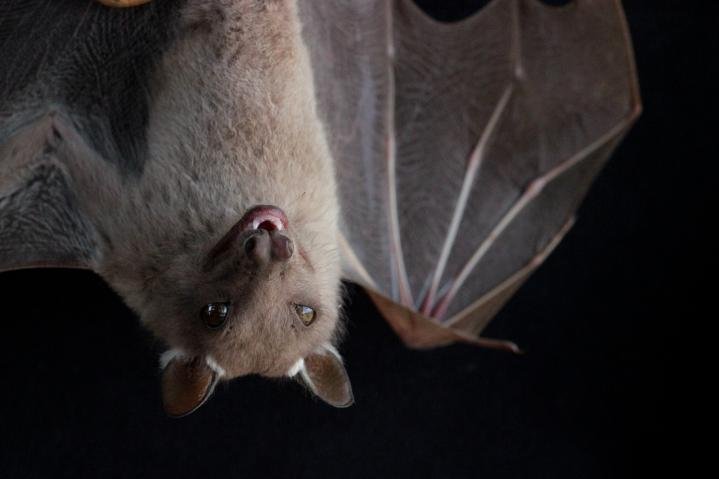New research suggests birds and bats, including species like the Kenyan fruit bat, Epomophorus wahlbergi, don't rely on their gut microbiome the same way humans and other mammals do. Photo by
Holly Lutz/Field Museum
Jan. 7 (UPI) -- The gut microbiome plays an important role in human health. In fact, most mammals have a unique relationship with the communities of microbes living in their intestines.
Scientists can predict what an animal's gut microbiome is likely to be like by studying the microbes in the guts of their closest relatives. Or at least, that's what they thought.
A new study of the gut microbiomes of bats and birds -- published Tuesday in the journal mBio -- suggests not all vertebrates benefit from the microbes living in their intestines.
Previous studies suggest the relationship between mammals and gut microbiomes is quite old. In other words, as mammals have evolved, their gut microbiomes have evolved along with them.
"Gut microbes serve a function that is presumably advantageous in these groups and is therefore conserved over evolutionary timescales," Holly Lutz, a postdoctoral researcher at the University of California, San Diego and a research associate at Chicago's Field Museum, told UPI in an email. "In bats and birds, we see no such pattern, suggesting that perhaps these flighted vertebrates do not benefit as strongly -- if at all -- from their gut microbiota."
For the study, scientists analyzed fecal samples from nearly 900 vertebrates, examining the relationships between mammals, birds, reptiles and amphibians and their gut microbiomes. The effort involved scientists, museum collections and zoo directors from across the globe.
When scientists sequenced the DNA in the samples and organized them into family trees the way related species are, they found the gut microbiomes of bats and birds were outliers. The makeup of microbial communities in the guts of birds and bats appeared almost haphazard, as if bird and bat species carry whatever microbes they happened to have picked up from their last few meals.
The research could undermine many of the assumptions scientists have made about the importance of gut bacteria to vertebrates.
Most research into the gut microbiomes of vertebrates has used humans and domestic animals like dogs or rodents as models.
"The synthesis of these findings has led to the general conclusion that vertebrates share intimate and functionally significant associations with microbial symbionts in the digestive tract," Lutz said. "The fact that this general observation does not appear to apply to bats and birds is important not only because it suggests a new paradigm, but because this new paradigm would hold for two vertebrate groups that comprise a major proportion of vertebrate biodiversity."
There are approximately 10,000 species of birds and some 1,200 species of bats.
"Compare those numbers to only approximately 3,400 species of non-flighted mammals and it's hard to conclude that bats and birds are the exception rather than the rule," Lutz said.
What about taking to the skies altered the relationship between bats and birds and their gut microbiomes? Scientists aren't entirely sure.
Research suggests the length of the intestines in birds and bats are shorter than those of similarly sized flightless mammals. As a result, the guts of birds and bats host fewer microbes. Birds and bats also absorb nutrients from the the food passing through digestive tract more quickly. Scientists suspect this adaptation allows bats and birds to carry smaller amounts of digested material, making it easier to get and remain airborne.
As to how and when bats and birds abandoned gut microbes as a helpful physiological tool, scientists can't be certain, but the latest findings suggest the adaptation was an evolutionary concession made in order to take to the skies.
Lutz and her colleagues are currently working to study how the unique microstructures found in the intestines of birds and bats influence their gut microbiome. The researchers are also interested in studying whether the unique nature of the gut microbiomes of bats and birds make them more susceptible to pathogens.















